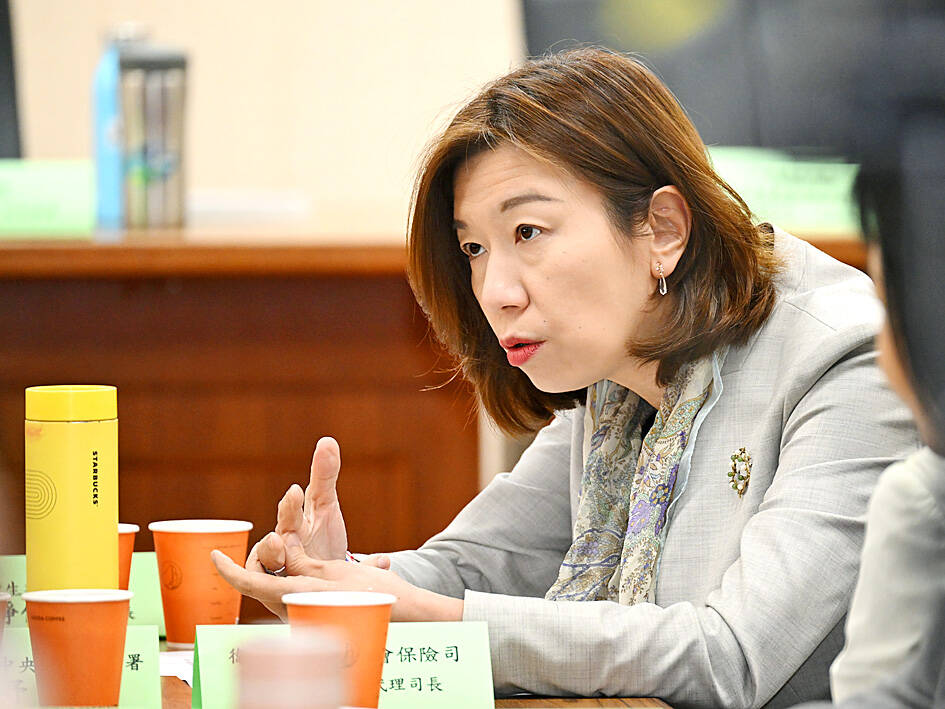Taiwan aims to start producing its own blood bags — a key item for saving lives on the battlefield — adding to signs that President William Lai (賴清德) is stepping up preparations for a potential conflict with China.
The Ministry of Health and Welfare has been working closely with other government agencies, including the National Security Council, to enhance Taiwan’s medical preparedness for emergencies, Deputy Minister of Health and Welfare Lin Ching-yi (林靜儀) said.
Bolstering domestic production capacity for key medical supplies, including blood bags, is a part of the strategy, as is ensuring that imports of medical supplies are secure, she said.

Photo: Chen Yi-kuan, Taipei Times
“The COVID-19 pandemic and the war in Ukraine have underscored the risks of relying solely on foreign sources for essential medicines and medical equipment,” Lin said.
Ukraine’s healthcare resources have been strained during its fighting with Russia, leading to shortages of oxygen, medications and more.
Lai has made preparing Taiwan’s population of more than 23 million for a possible conflict with China a central part of his policymaking since he took office a little more than a year ago. Last year, he held the first meeting of a civil defense committee that discussed ways to ensure key energy facilities and critical infrastructure can operate in a crisis.
The Chinese People’s Liberation Army (PLA) has held an unprecedented amount of military exercises around Taiwan since Lai took over, underscoring Beijing’s deep distrust of a leader it worries would formalize Taiwanese independence.
Officials in Taipei downplayed the likelihood of a conflict with China any time soon, although US Secretary of Defense Pete Hegseth has warned that more urgency is needed to prepare for a potential PLA invasion.
From at least last year, the US — Taipei’s main military backer — started raising concern about Taiwan’s blood reserves and distribution capabilities, Taiwanese officials familiar with the matter said, asking not to be identified discussing the sensitive matter.
Specific issues included whether Taiwan had enough electricity supplies and backup power systems for blood banks, one of the officials said.
The US was also worried about adequate cold-chain logistics and storage, the person added.
In a report to lawmakers in March, the Ministry of National Defense said it planned to establish its first blood donation center by the end of this year, adding that a program to create a centrally managed blood supply system would be set up next year.
Taiwan relies on imports for its supply of blood bags because that is cheaper than making them domestically, Lin said.
Blood bags, primarily made of medical-grade polyvinyl chloride, are used in the collection, storage and transfusion of blood, she said.
A ready supply is critical in wartime, and would help save the lives of soldiers.
The National Security Council declined to comment on the push to improve medical preparedness.
Nan Ya Plastics Corp, a subsidiary of Taiwan’s largest petrochemical conglomerate, Formosa Plastics Group, has built the nation’s first blood bag factory near Taipei, the Chinese-language Economic Daily News reported, citing a person at a firm that cooperates with Nan Ya Plastics on the plant.
It is in the process of applying for a certificate to produce the containers, the newspaper said in a separate report that cited comments Nan Ya Plastics chairman Wu Chia-chau (吳嘉昭) made at an annual general meeting last week.
Nan Ya Plastics did not immediately respond to a request for comment.

“China is preparing to invade Taiwan,” Deputy Minister of Foreign Affairs Francois Wu (吳志中) said in an exclusive interview with British media channel Sky News for a special report titled, “Is Taiwan ready for a Chinese invasion?” the Ministry of Foreign Affairs said today in a statement. The 25-minute-long special report by Helen Ann-Smith released yesterday saw Sky News travel to Penghu, Taoyuan and Taipei to discuss the possibility of a Chinese invasion and how Taiwan is preparing for an attack. The film observed emergency response drills, interviewed baseball fans at the Taipei Dome on their views of US President

The Central Weather Administration (CWA) today issued a "tsunami watch" alert after a magnitude 8.7 earthquake struck off the Kamchatka Peninsula in northeastern Russia earlier in the morning. The quake struck off the east coast of the Kamchatka Peninsula at 7:25am (Taiwan time) at a depth of about 19km, the CWA said, citing figures from the Pacific Tsunami Warning Center. The CWA's Seismological Center said preliminary assessments indicate that a tsunami could reach Taiwan's coastal areas by 1:18pm today. The CWA urged residents along the coast to stay alert and take necessary precautions as waves as high as 1m could hit the southeastern

ECONOMIC BENEFITS: The imports from Belize would replace those from Honduras, whose shrimp exports have dropped 67 percent since cutting ties in 2023 Maintaining ties with Taiwan has economic benefits, Ministry of Foreign Affairs officials said yesterday, citing the approval of frozen whiteleg shrimp imports from Belize by the Food and Drug Administration (FDA) as an example. The FDA on Wednesday approved the tariff-free imports from Belize after the whiteleg shrimp passed the Systematic Inspection of Imported Food, which would continue to boost mutual trade, the ministry said. Taiwan’s annual consumption of whiteleg shrimps stands at 30,000 tonnes, far exceeding domestic production, the ministry said. Taiwan used to fill the gap by importing shrimps from Honduras, but purchases slumped after Tegucigalpa severed diplomatic ties with Taiwan

The Executive Yuan yesterday approved a southwestern extension of the Sanying MRT Line from New Taipei to Bade District (八德) in Taoyuan, with a goal of starting construction by late 2026. The 4.03-kilometer extension, featuring three new stations, will run from the current terminus at Yingtao Fude Station (LB12) in New Taipei City to Dannan Station (LB14), where it will connect with Taoyuan’s Green Line, New Taipei City Metro Corp said in a statement. This extension will follow the completion of core Sanying Line, a 14.29-kilometer medium-capacity system linking Tucheng (土城), Sansia (三峽)